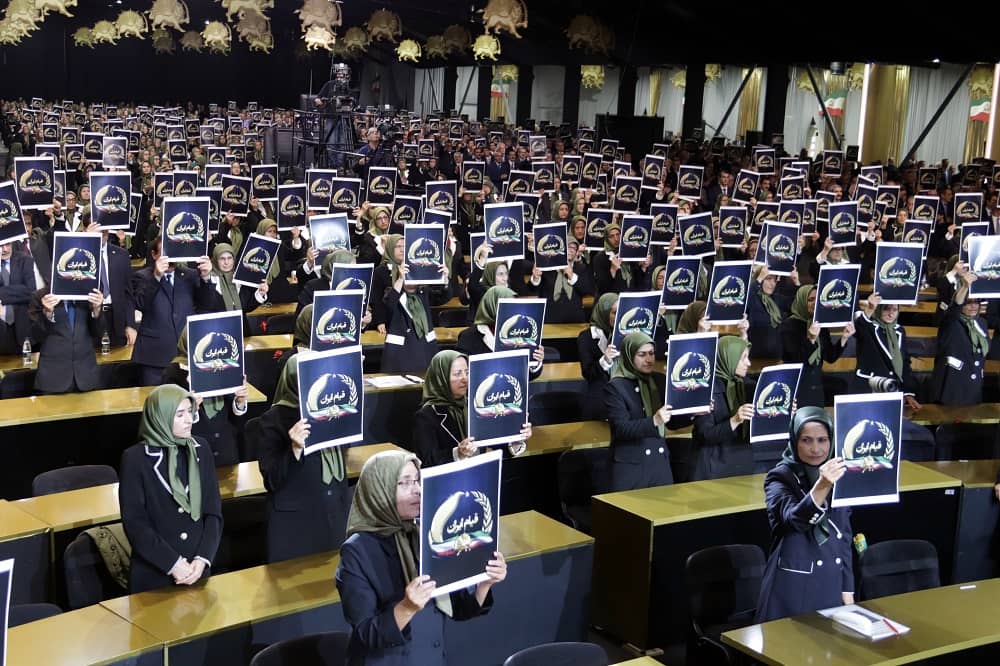
Last week, the head of Branch 26 of the Revolutionary Court, infamous for executing tens of thousands of dissidents during the clerical dictatorship, sentenced three women associated with the People’s Mojahedin of Iran (PMOI/MEK) to lengthy prison terms. Forough Taghipour, Marzieh Farsi, and Zahra Safaei received sentences of 15 years, 5 years, and 15 years in prison, respectively, for their support of the PMOI.
Forough Taghipour, a 29-year-old accounting graduate, was arrested for the second time on August 21, 2023, in Tehran. Her family has a history of persecution due to their PMOI affiliations, with her father and sister now residing in Ashraf 3. Initially detained in March 2020 alongside her mother for anti-regime activities, Taghipour has faced the regime’s brutality firsthand.
Marzieh Farsi, 56, a mother battling cancer, and Zahra Safaei, 60, also faced re-arrest and sentencing for their beliefs. Farsi’s brother was a victim of the 1988 massacre, a grim event in which the regime executed thousands of PMOI-affiliated prisoners. Safaei, previously imprisoned for eight years in the 1980s, represents the enduring spirit of resistance against the regime’s tyranny.
International #Women’s Day Conference: #Iran’s Women’s Leadership for Democracy and Equalityhttps://t.co/dWi15bTaYP
— NCRI-FAC (@iran_policy) March 6, 2023
Moreover, Maryam Akbari Monfared, a mother of three who has been imprisoned for 14 years without a furlough, received an additional two-year sentence. Monfared’s incarceration stems from her quest for justice for her four siblings, executed by the regime in the 1980s.
These women symbolize the regime’s long-standing oppression of those associated with the PMOI, particularly during the 1980s and the 1988 massacre, where tens of thousands were executed, many for refusing to renounce their affiliations under torture. The regime’s targeted brutality towards PMOI-affiliated women raises critical questions about its purported Islamic values and its extreme interpretations that marginalize and oppress women.
The PMOI has been at the forefront of challenging the regime’s distorted use of Islam and advocating for the rights of all Iranians, including non-Muslim women. Remarkably, women occupy all leadership positions within the PMOI and comprise over 50% of the National Council of Resistance of Iran (NCRI), showcasing the transformative power of women’s leadership in the face of oppression.
MUST-WATCH: Excerpt from @Maryam_Rajavi landmark speech at London's Earls Court, June 21, 1996. "Today's oppressed women are the victors of tomorrow. Their voices will echo forever." So true! pic.twitter.com/sNdH4fSbSB #IranRevoIution2022
— Ali Safavi (@amsafavi) November 28, 2022
Despite decades of massacres, restrictions, and forced displacements, the PMOI and NCRI continue to pose a formidable challenge to Tehran’s rule, inspiring female-led uprisings and a broader quest for justice and freedom across Iran. The resilience of these women, in the face of severe punishment, highlights the ongoing struggle against a regime that seeks to silence dissent by any means necessary, yet it also underscores the indomitable spirit of those fighting for a freer, more inclusive Iran.

MEK Iran (follow us on Twitter and Facebook), Maryam Rajavi’s on her site, Twitter & Facebook, NCRI (Twitter & Facebook), and People’s Mojahedin Organization of Iran – MEK IRAN – YouTu







